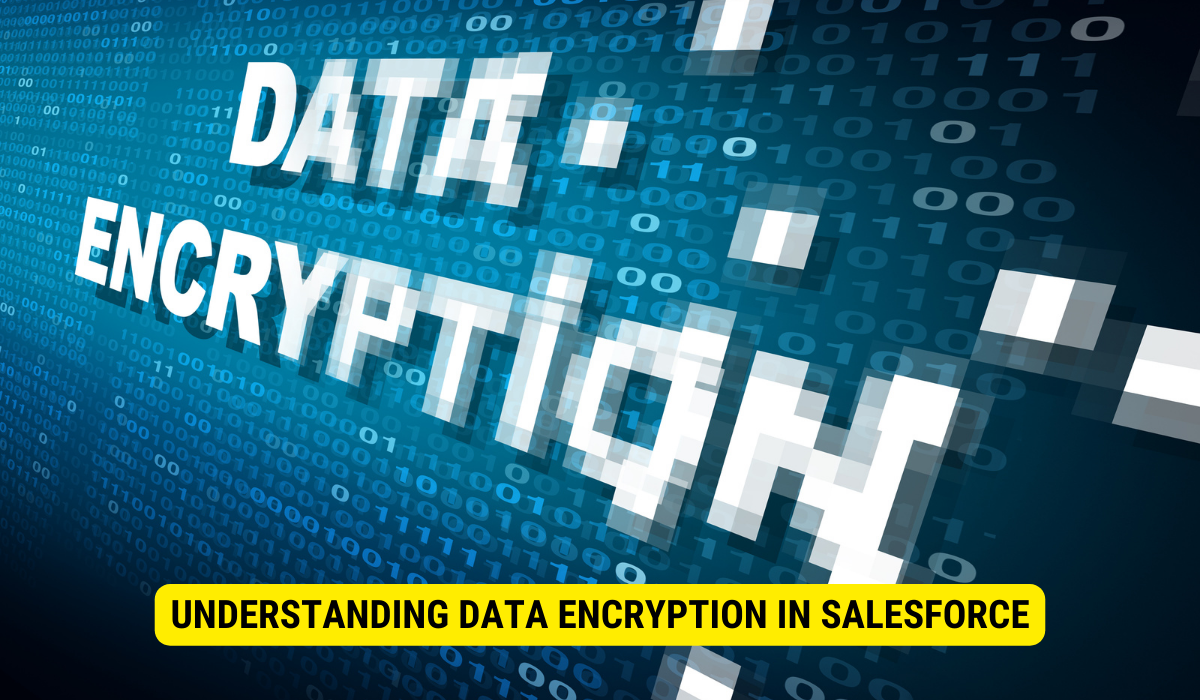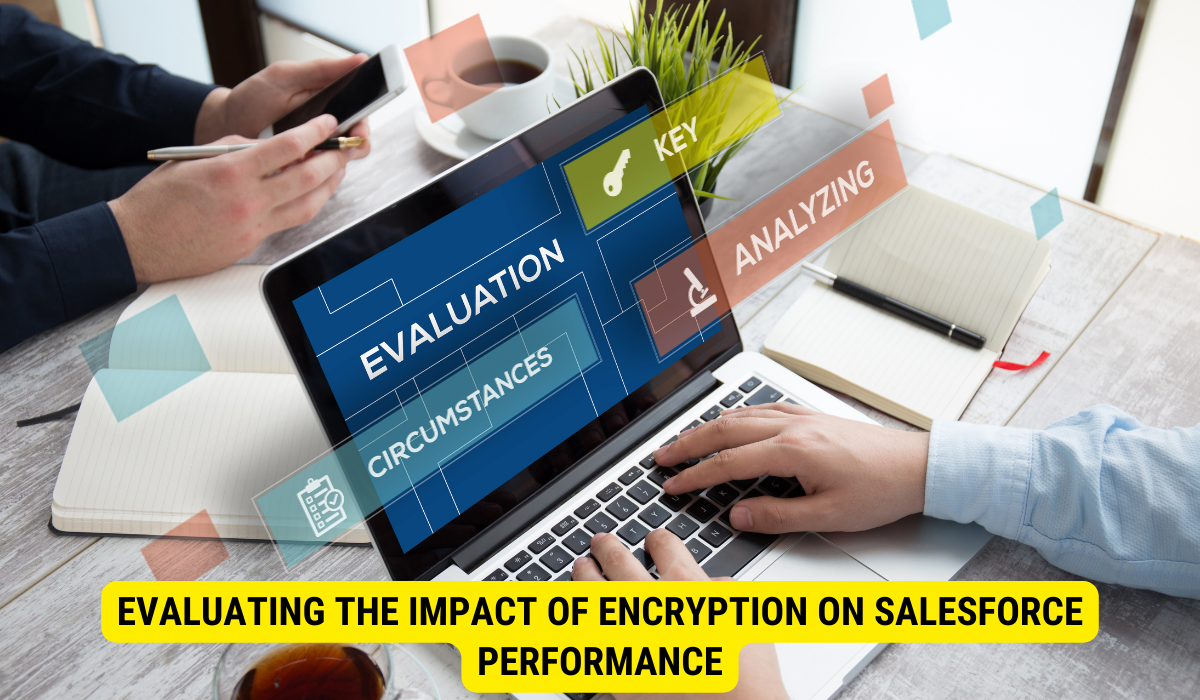Data that should be encrypted in Salesforce includes Personal Identifiable Information (PII) such as social security numbers, driver’s license numbers, financial data like credit card numbers and bank account details, and sensitive business information like intellectual property or trade secrets. Encrypting these categories of data ensures data security, regulatory compliance, and customer trust.
Data security is a paramount concern for businesses today, particularly with respect to customer and company information stored in cloud-based platforms like Salesforce. Encryption stands as a pivotal method for safeguarding this data against unauthorized access. I will explore the significance of data encryption in Salesforce, grasp the fundamental concepts associated with data encryption, pinpoint the categories of data that necessitate encryption, delve into various approaches to implementing encryption within Salesforce, and assess the repercussions of encryption on Salesforce’s performance.
Understanding Data Encryption in Salesforce
When it comes to protecting sensitive data in Salesforce, data encryption assumes a pivotal role. Encryption involves the transformation of plain-text data into a coded format by employing encryption algorithms. This transformation ensures that only authorized individuals possessing the encryption keys can decode and access the data. Consequently, even if the data is compromised, it remains unreadable and ineffectual to unauthorized parties.
The Significance of Data Encryption
Data encryption plays a pivotal role in preserving the privacy and security of sensitive information. Encrypting data within Salesforce aids businesses in adhering to various data protection regulations and industry standards, including GDPR and HIPAA. Furthermore, it fosters trust among customers, who are more inclined to share their personal information when assured of its secure encryption.
Key Concepts of Salesforce Data Encryption
Before delving into the specifics of which data to encrypt, it is crucial to acquaint oneself with key concepts underpinning Salesforce data encryption:
- Data-at-Rest Encryption pertains to encrypting data stored in databases or on storage devices, ensuring data remains protected even if the physical storage is compromised.
- Data-in-Transit Encryption entails encrypting data as it traverses between devices or networks, guaranteeing the security of data during transmission, thereby thwarting unauthorized interception.
- Data Field-Level Encryption empowers organizations to encrypt specific fields within Salesforce objects, thereby affording additional protection for sensitive data.
Data-at-Rest Encryption represents a critical facet of data safeguarding within Salesforce. It guarantees that even if an unauthorized individual gains access to the physical storage where data is stored, they are incapable of reading or using the encrypted data. This is achieved through the utilization of robust encryption algorithms and secure management of encryption keys.
Equally important is Data-in-Transit Encryption, which ensures data remains secure while in transit between devices or networks, especially vital when data traverses the internet or other public networks where interception risks are heightened. By encrypting data during transmission, organizations can deter unauthorized access and tampering with the information.
Data Field-Level Encryption offers added protection for sensitive data within Salesforce. This feature empowers organizations to encrypt specific fields within their Salesforce objects, such as Social Security numbers or credit card information. Consequently, even if an unauthorized user gains access to the Salesforce platform, they will be unable to view or utilize the encrypted data without the requisite encryption keys.
Implementing data encryption in Salesforce requires meticulous planning and consideration. Organizations must identify the specific data elements necessitating encryption based on their sensitivity and regulatory obligations. Additionally, robust encryption key management practices must be established to ensure the security and integrity of encryption keys.
By implementing data encryption in Salesforce, organizations can bolster the overall security posture of their data and shield sensitive information from unauthorized access. This facilitates compliance with data protection regulations and instills confidence in customers, who are assured that their personal information is securely encrypted.
Identifying What Data to Encrypt in Salesforce
It is important to note that not all data within Salesforce requires encryption. Identifying the data types that mandate encryption is crucial to ensure appropriate protection. Here are some illustrative examples:
- Personal Identifiable Information (PII): Data such as social security numbers, driver’s license numbers, or any information that can be used to identify an individual should be encrypted. Encrypting PII is pivotal in preserving the privacy and security of individuals’ personal information, averting unauthorized access, and mitigating the risk of identity theft. It also ensures compliance with data protection regulations and fosters trust among customers who appreciate the safeguarding of their sensitive information.
- Financial Data: Financial data, encompassing credit card numbers, bank account details, or any payment-related information, should be encrypted to forestall unauthorized access and mitigate the risk of financial fraud. Encrypting financial data is instrumental in upholding the integrity of financial transactions and shielding customers’ financial information. It adds an additional layer of security, rendering it substantially more challenging for hackers to access sensitive financial details. Encryption in this context also facilitates compliance with industry regulations, such as the Payment Card Industry Data Security Standard (PCI DSS), and engenders confidence among customers when conducting transactions.
- Sensitive Business Information: Confidential business information, including intellectual property, trade secrets, or proprietary data, should be encrypted to safeguard it from competitors or malicious actors. Encrypting sensitive business information assumes a pivotal role in protecting an organization’s competitive advantage and ensuring the confidentiality of valuable data. This encryption thwarts unauthorized access and mitigates the risk of intellectual property theft or corporate espionage, allowing businesses to retain their market position and protect their innovations, research, and development efforts. Furthermore, encrypting sensitive business information can aid organizations in complying with industry-specific regulations, such as the Health Insurance Portability and Accountability Act (HIPAA) for healthcare organizations or the General Data Protection Regulation (GDPR) for companies operating within the European Union. Adhering to these regulations averts substantial fines and underscores a commitment to data privacy and security.
Implementing Encryption in Salesforce
In the realm of implementing encryption in Salesforce, several approaches can assist organizations in safeguarding their sensitive data. Salesforce Shield Platform Encryption and custom encryption solutions are two prominent options. It is imperative to grasp the benefits and considerations associated with each approach.
Salesforce Shield Platform Encryption
Salesforce Shield Platform Encryption stands as a native encryption solution offered by Salesforce. It furnishes comprehensive features that empower businesses to encrypt sensitive data across various levels, encompassing fields, objects, and files. This robust encryption framework guarantees that data remains secure and protected, even when residing within the Salesforce platform.
One of the key advantages of Salesforce Shield Platform Encryption lies in its simplicity. This solution streamlines encryption management within the Salesforce environment. Administrators can effortlessly define encryption policies, specify which fields or objects necessitate encryption, and exert control over access to encrypted data.
Moreover, Salesforce Shield Platform Encryption supports a wide array of encryption algorithms, including the highly secure AES-256. This ensures organizations meet their specific encryption requirements and comply with industry regulations.
Custom Encryption Solutions
While Salesforce Shield Platform Encryption offers a robust and user-friendly encryption solution, some organizations may harbor unique encryption requirements that extend beyond its capabilities. In such instances, the implementation of custom encryption solutions becomes a viable option.
Custom encryption solutions entail the integration of third-party encryption tools or the development of custom encryption functionalities within Salesforce using Apex code. This approach enables organizations to tailor encryption methods to their specific needs and leverage advanced encryption algorithms or techniques.
Custom encryption solutions offer the advantage of flexibility. Organizations can opt for encryption algorithms aligned with security standards and regulatory obligations. Additionally, custom encryption solutions provide granular control over encryption processes, allowing organizations to encrypt data at a finer level of granularity than what Salesforce Shield Platform Encryption offers.
However, it is worth noting that implementing custom encryption solutions demands additional development effort and expertise. Organizations must meticulously evaluate the trade-offs between the benefits of customization and the resources required for implementation and maintenance.
In conclusion, when contemplating the implementation of encryption in Salesforce, organizations are presented with multiple avenues. Salesforce Shield Platform Encryption presents a native and user-friendly solution that streamlines encryption management within the Salesforce ecosystem. Conversely, custom encryption solutions offer flexibility and customization options for organizations harboring unique encryption prerequisites. Through a meticulous assessment of their needs and a thorough consideration of the benefits and implications of each approach, organizations can craft an effective encryption strategy to safeguard their sensitive data within Salesforce.
Managing Encrypted Data in Salesforce
Once data within Salesforce is encrypted, effective data management becomes imperative. This entails the establishment of access controls, delineation of user permissions, and the implementation of robust data backup and recovery strategies.
Access Controls and User Permissions
Organizations must establish appropriate access controls and user permissions to ensure that only authorized individuals can decrypt and access sensitive data. This preventive measure serves to mitigate data breaches stemming from internal threats.
Data Backup and Recovery

Regular data backups are indispensable to guarantee the availability and integrity of encrypted data. In the event of data loss or system failure, a backup and recovery strategy empowers businesses to restore encrypted data to its original state.
Evaluating the Impact of Encryption on Salesforce Performance
While data encryption stands as a critical pillar of data security within Salesforce, it is essential for organizations to strike a balance between data security and system efficiency. While encryption is critical for safeguarding sensitive information, it can introduce certain performance considerations that should not be overlooked.
- Speed and Performance Considerations
Data encryption typically requires additional computational resources, as the encryption and decryption processes involve complex mathematical operations. As a result, there may be a slight impact on system performance, especially when dealing with large volumes of data. To mitigate this impact, organizations should conduct thorough performance testing and optimization of their encryption configurations.
-
- Testing: Before implementing encryption in a production environment, it’s crucial to conduct thorough testing in a staging or testing environment. This allows organizations to assess the performance impact and make necessary adjustments before deployment.
- Optimization: Encryption algorithms and methods can vary in terms of their computational overhead. Organizations should carefully select encryption algorithms and key sizes that strike a balance between security and performance. For example, Advanced Encryption Standard (AES) is a widely accepted encryption algorithm that offers a good balance between security and performance.
- Hardware Acceleration: Some organizations may opt to leverage hardware-based encryption solutions, such as dedicated encryption hardware or cryptographic acceleration cards. These can significantly improve encryption and decryption speeds, reducing the performance impact on the Salesforce platform.
- Impact on Salesforce Features and Functionality: Salesforce offers a wide range of features and functionalities, and the introduction of encryption can impact some of these capabilities. It’s essential to understand how encryption may affect various aspects of the platform:
-
- Search and Reporting: Encrypted data may not be searchable or reportable in the same way as unencrypted data. Organizations should assess how encrypted fields will be used in search queries and reports and plan accordingly.
- Integration: If your organization integrates Salesforce with other systems, consider how encrypted data will be handled during data transfers and exchanges. Encryption may require adjustments to integration processes.
- Third-Party Apps: Some third-party applications and Salesforce AppExchange apps may need to be modified to work seamlessly with encrypted data. Ensure that these applications are compatible with your encryption strategy.
- User Experience: Users may experience some changes in the user interface when working with encrypted data. For example, encrypted fields might display as masked or unreadable, which can impact the user experience.
Key Takeaways
- Data encryption is crucial for safeguarding sensitive information in Salesforce, especially in cloud-based environments.
- Salesforce provides native encryption solutions like Salesforce Shield Platform Encryption, while custom encryption solutions offer flexibility for unique requirements.
- Identifying what data to encrypt is essential; focus on Personal Identifiable Information (PII), financial data, and sensitive business information.
- Implementing encryption requires careful planning, testing, and consideration of performance implications.
- Effective management of encrypted data involves access controls, user permissions, data backup, and recovery strategies.
- Balance security and performance when evaluating the impact of encryption on Salesforce.
FAQs
Q1: What is the importance of data encryption in Salesforce?
A1: Data encryption in Salesforce is vital for protecting sensitive information, complying with regulations, and building trust with customers. It ensures that even if data is compromised, it remains unreadable to unauthorized parties.
Q2: What are some examples of data that should be encrypted in Salesforce?
A2: Data types that should be encrypted in Salesforce include Personal Identifiable Information (PII), financial data (credit card numbers, bank details), and sensitive business information (intellectual property, trade secrets).
Q3: What are the two main approaches for implementing encryption in Salesforce?
A3: Organizations can use Salesforce’s native encryption solution, Salesforce Shield Platform Encryption, or opt for custom encryption solutions tailored to their unique requirements.
Q4: What considerations should be taken into account when implementing encryption in Salesforce?
A4: Organizations should consider the impact on performance, user experience, integration with third-party apps, and how encrypted data will be searched and reported.
Q5: How can organizations effectively manage encrypted data in Salesforce?
A5: Effective management includes setting up access controls, defining user permissions, implementing data backup and recovery strategies, and evaluating the performance impact.
Conclusion
In summary, while the benefits of data encryption in Salesforce are substantial for data security and compliance, organizations must carefully assess and manage the potential impact on performance and functionality. This involves thorough testing, optimization, and consideration of how encryption will affect various aspects of Salesforce usage. By striking the right balance between security and performance, organizations can ensure a secure and efficient Salesforce environment that meets their data protection needs.


